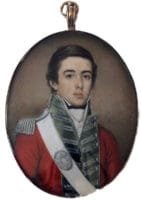Tag Archives: gentlemanly professions
Naval Officers: Self-made gentlemen
Naval service was different than the other branches of the military, and naval officers different than army officers.
Continue reading →What makes a gentleman?
If one wanted to marry a gentleman, one must identify said elusive creature first. So how exactly could one pick out a gentleman from the rest? The nuances of social class and what makes a gentleman a gentleman remains a perennial source of confusion for Austenesque and Regency readers. The pages of Austen’s stories are littered with gentlemen, but offer absolutely no explanation of what that title actually meant. Of course, her readers knew exactly … Continue reading →
The Militia-A Different Breed of Officer
In Austen’s Pride and Prejudice we encounter a military regiment temporarily stationed in Meryton. These men are members of the militia, not the regular army (discussed in the last post.) While at first blush, there may seem little difference between the regular army (the Regulars) and the militia, the differences are striking and significant. What was the Militia? The militia served as a peace keeping force on home soil. History had taught that a … Continue reading →
An Officer and a Gentleman
In Jane Austen’s writing we encounter many military men: Colonel Brandon, Colonel Fitzwilliam, Captain and General Tilney, Lieutenants Wickham and Denny. In her tales we often read of how these men purchased their commissions, but what was the motivation for doing so and how did the process work? Being an officer made you a gentleman In the Regency era, social status was closely related to career and wealth. An Army officer or Navy officer … Continue reading →

